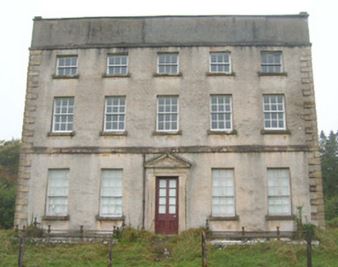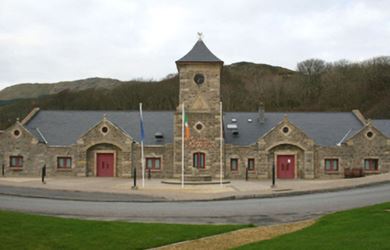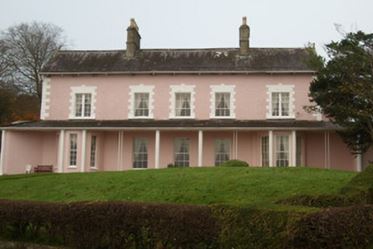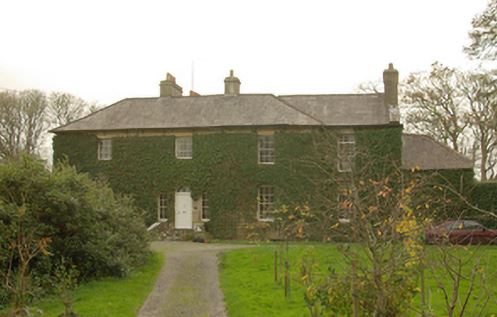Belville (Banagh)
Houses within 15km of this house
Displaying 19 houses.
Houses within 15km of Belville (Banagh)
Displaying 19 houses.
| House name | Description | |
|---|---|---|
| Ferns Hill Glebe House | This property was held in fee by Reverend G. Tredennick at the time of Griffith’s Valuation, when it was valued at £24. It is labelled as both Glebe and Ferns Hill on all editions of the Ordnance Survey maps up to the 1940s. It is no longer extant. | |
| Coolbeg | ||
| Drumbeg House (Inver) | A house named Drumbeg or Cloverhill is shown in the townland of the same name on the 25-inch Ordnance Survey map. At the time of Griffith’s Valuation in the 1850s, it leased by William Sinclair from the Conyngham estate and valued at £21 15s. Drumbeg House is still extant. |

|
| Spamount (Killaghtee) | Sarah Stephens was leasing this property from Reverend Samuel Montgomery’s estate at the time of Griffith’s Valuation. The house was valued at £12. Lewis recorded it as the seat of M. Steevens in 1837. In 1911 the house was owned by Francis P. Henry. It is labelled Spamount on all Ordnance Survey maps. Buildings are still extant at the site. | |
| Mahgeracar | At the time of Griffith’s Valuation, in the 1850s, Thomas Ellis was leasing property in Magheracar townland from the Conolly estate. The building was valued at £15 15s. Ellis, in turn, was leasing a property to William Forde, valued at over £10. | |
| The Hall (Inver) | This property was held in fee by the Marquis of Conyngham’s estate at the time of Griffith’s Valuation, when it was valued at £38. Lewis records that it was occupied by a Colonel Pratt in 1837, though notes that it was a seat of the Conyngham family. The National Inventory of Architectural Heritage suggests the house was built some time in the 1750s. It is still extant. |

|
| Salthill House (Inver) | Robert Russell was leasing this property from the Conyngham estate at the time of Griffith’s Valuation when it was valued at £20. It is still extant and occupied. A smaller property, labelled Sea View, is shown on the shoreline adjacent to the main house on the 1st edition Ordnance Survey map but is not labelled on the later editions. |

|
| Wood Lodge (Inver) | Daniel J. Cruise was occupying this property at the time of Griffith’s Valuation, when it was valued at £10 and leased from the Conyngham estate. It is labelled Wood Lodge on the 25-inch Ordnance Survey map. | |
| Fintragh | Anne Hamilton was occupying the house at Fintragh at the time of Griffith’s Valuation when it was valued at £16. A newer house was constructed at Fintragh in the later 19th century[G689766]. It was burned in 1923, though reconstructed before being demolished in the later 20th century. The stableblock, built on the site of the original Fintragh House, is still extant, and has operated as a restaurant. |

|
| Carricknagore | William Barrett was occupying Carricknagore at the time of Griffith’s Valuation. It held in fee and valued at over £13. It was occupied by his descendants into the early 20th century. A building still exists at the site. | |
| Woodhill House (Banagh) | Rev. G. Tredennick held Woodhill in fee at the time of Griffith’s Valuation when it was valued at £20. Lewis had recorded it as the seat of Major Nesbit in 1837. In 1906 it was owned by General James R.K. Tredennnick and valued at £20. Woodhill is still extant though altered and is now a hotel. | |
| Woodhill B [Wood House](Banagh) | At the time of Griffith’s Valuation, a second house, valued at £10 10s, in Woodhill townland was leased from the Tredennick estate by Blakeney Gubbins. In 1858 Blakeney Gubbins was noted in the local press as “late sub Inspector of Revenue Police”. This may refer to a property originally built by Tredennick as a female primary school and later still known as Wood House. It is still extant. | |
| Bruckless | Andrew Cassidy was leasing Bruckless from the Tredennick estate at the time of Griffith’s Valuation in the 1850s, when it was valued at £18. The complex also included a tannery. In 1837 Lewis had referred to Cassidy's having a seat in Bruckless though he also notes a house there owned by Captain Nesbit. Bruckless was still occupied by the Cassidy family in 1911. The house is still extant and occupied. | |
| Bruckless Cottage | At the time of Griffith’s Valuation Bruckless Cottage was occupied by Lindsay Barrett, leasing from the Tredennick estate, when the house was valued at £15. It is labelled Bruckless Cottage on all editions of the Ordnance Survey maps. It is no longer extant. | |
| St. Ernans | John Hamilton held St. Ernans in fee at the time of Griffith’s Valuation when the building complex was valued at £46 as well as a mill valued at £28. In the later 20th century the property functioned as a hotel. The National Inventory of Architectural Heritage suggests it was built in the 1820s but extended and modified later in the nineteenth century. It is still extant. |

|
| Bonnyglen | The Sinclair estate held two properties in fee in this townland at the time of Griffith’s Valuation. A house valued at £8 was unoccupied while a caretaker’s house was valued at almost £5. In 1906 William Montgomery Sinclair was the owner of a mansion house valued at £28 at Bonnyglen. It is no longer extant and modern houses occupy the site. In 1837 Lewis had recorded Murray Babbington as the occupier of Bonnyglen. Documents included in the Chief Secretary Office papers at the National Archives of Ireland indicate Murray Babington acted as land agent for Alexander Murray. | |
| Murvagh House | Reverend John Kincaid held this property in fee at the time of Griffiths Valuation in the 1850s, when it was valued at £25. It is labelled Glebe House on the 1st edition Ordnance Survey map but as Murvagh House on the 25-inch map of the early twentieth century. It is still extant. |

|
| Rossylongan House | Robert Steele was leasing this property from the Murray Stewart estate at the time of Griffiths Valuation in the 1850s when it was valued at £16. He had previously leased it from the Murray estate as he is recorded by Lewis as the occupant in 1837. Murray Babington is noted as the owner of property in this townland in the Tithe Applotment records from the 1820s. In the early twentieth century the house was owned by Patrick McManus, a Donegal man who had settled in Argentina. Rossylongan is no longer extant. |

|
| Kilmacreddan House | At the time of Griffiths Valuation, Sophia Major was leasing this property from the Barton estate, when it was valued at £9. In 1868 it was offered for sale in the Landed Estates Court by Sophia Keane when the petitioner was Alexander Buchanan. Kilmacreddan is still labelled on the last edition of the 6-inch Ordnance Survey map but is no longer extant. |

